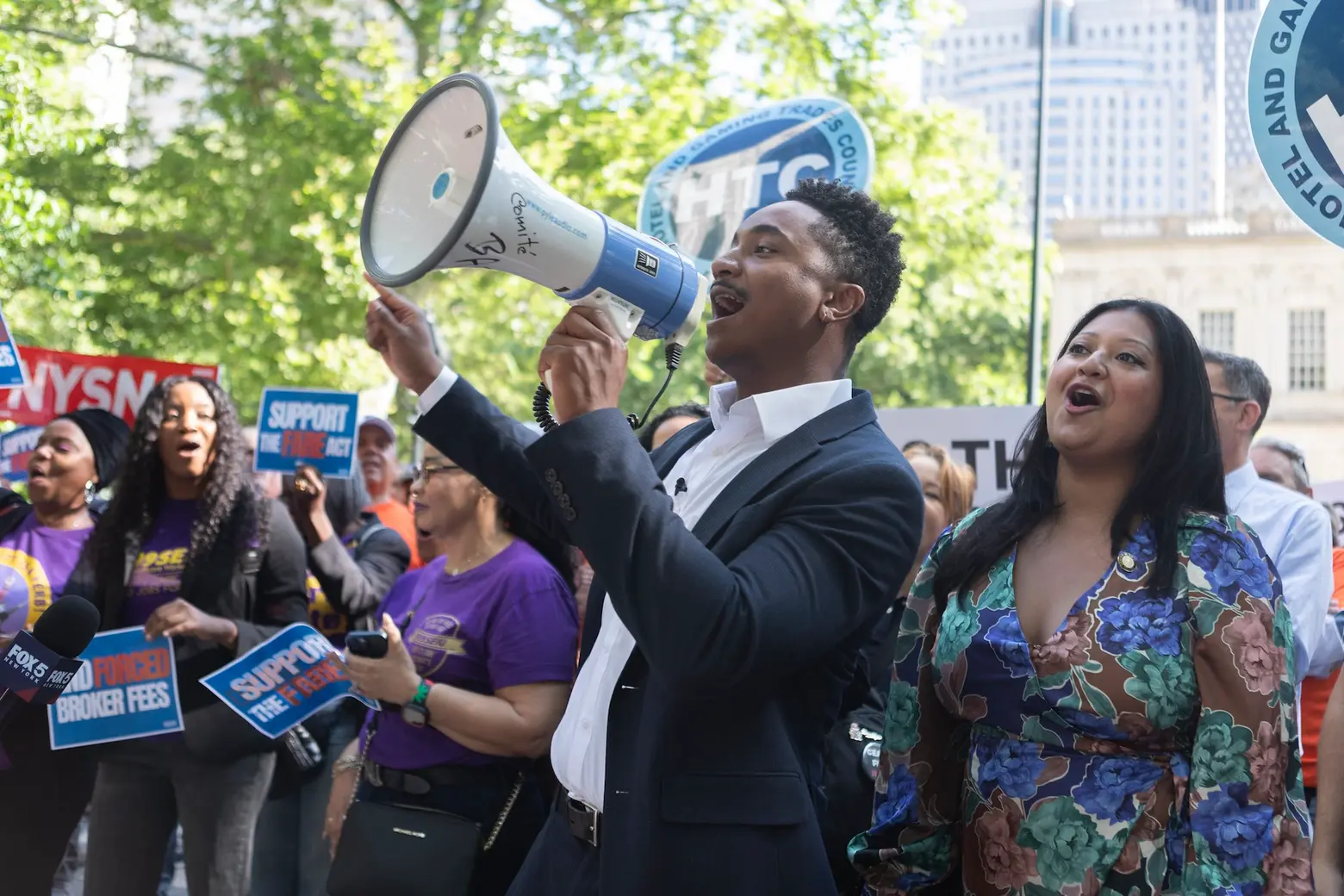NYC Council votes to end forced broker fees


Council Member Chi Ossé holds a broker fee bill rally in June 2024. Credit: Emil Cohen / NYC Council Media Unit on Flickr
New York City renters may soon no longer have to pay a broker fee when leasing an apartment. The Council on Wednesday voted to approve the Fairness in Apartment Rentals (FARE) Act, which shifts the payment of broker fees to the party who hired the broker, typically landlords or the management company. The bill was passed with a veto-proof majority of 42-8.
New York City and Boston are the only two major cities in the country where tenants pay broker fees, a one-time, up-front sum prospective renters pay brokers. The fee can range between one month’s rent and 15 percent of the total annual rent, in addition to a security deposit.
Under the current rules, the renter is responsible for paying the fee even if the agent is hired by the landlord or building management company. Since no law sets guidelines for how much agents can charge, the fees are negotiable, although many renters are unaware of this or believe it weakens their bargaining power in the city’s highly competitive market.
According to a report from the City Council, the average NYC renter moving to a new apartment spends $10,454 in upfront costs.
Council Member Chi Ossé first introduced the bill in February and a hearing was held in June, where hundreds of tenant advocates and real estate professionals testified during a seven-hour public hearing. During the June hearing, several renters testified they were expected to pay a fee for a broker they never met.
The amended bill mandates that landlords or brokers disclose all upfront fees to tenants and provide an itemized list of fees, including those owed to the landlord and other parties, before the tenant signs a lease. Failure to do so carries penalties starting at $1,000.
Ossé wrote the bill after struggling to find an apartment in his district, which includes Bed-Stuy and northern Crown Heights. He repeatedly encountered brokers representing landlords whose fees he was expected to pay before signing a lease, as reported by The City.
“The FARE act is simple,” Ossé said in a Wednesday press conference before the final vote. “It requires that whoever hires a broker in a rental transaction pays the broker fee. In too many millions of cases across our city, and decades of history, tenants have been forced to hand over thousands of dollars in fees to brokers they never hired nor wanted. The harm of this practice cannot be overstated.”
Ossé continued: “Families seeking to grow forgo having children because they can’t afford to move into a larger place. Children aging out of their parents’ homes are pushed into different neighborhoods or cities because they can’t afford to rent an apartment in their own community. Workers are not able to live near their jobs, victims are unable to leave domestic abuse, and people are unable to bring their talent and drive to our amazing city because of forced broker fees. Today we end that cruel and archaic practice.”
Brokers and the Real Estate Board of New York (REBNY) have spoken out against the measure, claiming landlords will pass the fees onto tenants by charging higher rents.
REBNY released its own version of the FARE Act, which would not alter who pays the broker fee but would require brokers to provide prospective tenants with a “tenant bill of rights.” This document would outline the fees tenants are responsible for, clarify that they are not required to use a broker and specify that the broker fee is negotiable, according to The Real Deal.
The FARE Act has the support of more than 30 advocacy groups, including the Legal Aid Society, Make the Road New York, and Housing Justice for All, as well as several unions.
Mayor Eric Adams, who previously worked as a real estate agent, has expressed concerns about how the legislation could affect small and struggling “mom-and-pop property owners” who might not be able to take on the cost of a broker according to The City.
“We need to analyze that if you pass the course on, think this for a moment, if you pass the course on to the small property owners, nothing stops them from building it into their rent,” Adams said during a press conference on Tuesday. “So it goes from a one-time fee to a permanent fee that’s built into your rent. And so some of the ideals collide with the reality of the operationalizing implementation.”
The mayor added: “We just got to get it right, make sure we reach the goals that we’re looking for, and at the same time, don’t hurt small property owners and try to give some relief to those who are trying to live in the city. So that’s the question that we need to look at. I think the bill has the right intention but sometimes good intentions do not get the results you’re looking for.”
When asked ahead of the vote about concerns over the mayor potentially vetoing the plan, Speaker Adrienne Adams said:
“We hope for a veto-proof majority. As far as the mayor’s plan, this bill was worked out with no objection from the administration, so we are hoping to proceed with this legislation and go forward in a positive way for the people.”
Broker fees were banned for a brief period in 2020. Under the Housing Stability and Tenant Protection Act signed by former Gov. Andrew Cuomo in 2019, landlords were prevented from deregulating rent-stabilized apartments and security deposits were capped at one month’s rent. As part of the guidance issued by the Department of State, brokers hired by landlords could not be paid by the prospective tenant.
After lawsuits by several brokerages, a judge struck down the law in 2021, ruling the ban was an “error of law.”
In 2019, a bill was proposed to cap broker fees to one month of rent but failed to move forward.
RELATED:
Source link




